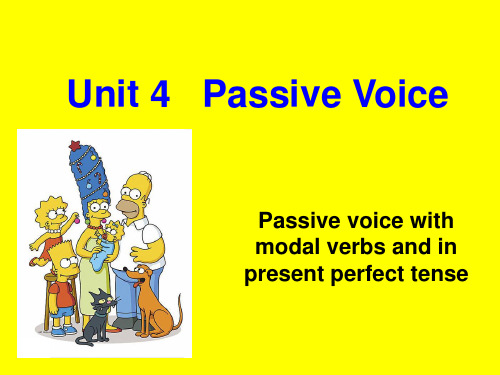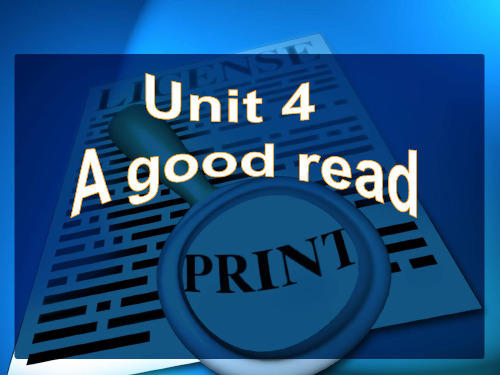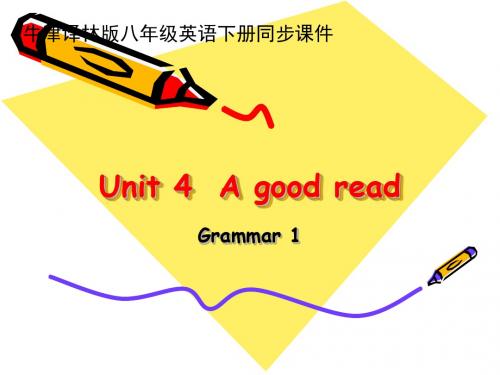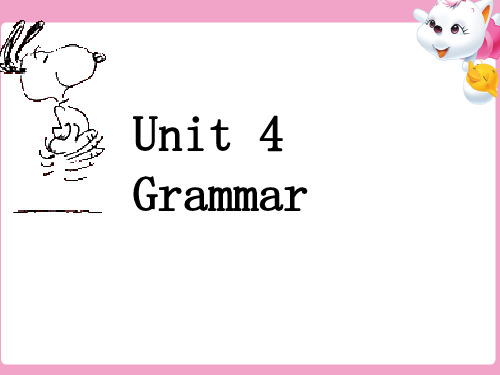牛津初中英语 八下 8B Unit4 Grammar 课件
牛津译林英语八年级下册Unit 4 Grammar(共23张PPT)

Gulliver wanted to leave Lilliput, but he didn’t know how to talk to the tiny people. verb + question word + to-infinitive Gulliver wanted to get a map, because it could show him where to find his boat. verb + object + question word + to-infinitive
4. We use _d_o_n__o_t _h_a_v_e_t_o_/_d_o_n_’_t _h_a_v_e_t_o_ to say that it is not necessary to do something.
Amy is telling her cousin Shirley some library rules. Complete what she says with must, must not, have to or do not have to. (P56)
2. We use _m_u__st__n_o_t _/ _m_u_s_t_n_’_t to say that something is not allowed.
3. We use _h_a_v_e__to_ when the situation makes something necessary.
run away in the future. However, he couldn't find
his boat, so he had to live in Lilliput. He had to help
最新牛津译林版初二英语八年级下册8B Unit4 Grammar PPT课件

Group discussion 3
They are discussing which color to paint the walls. You can ask your parents how much money to take with you.
结论3:
有些疑问词,如what, which, whose, how many, how much等,其后可以先接一个名词,再接动词
Using question words + to-infinitives
我们可以用“疑问词 + 动词不定式”结构 作动词的宾语。疑问词包括疑问代词who, what, which及疑问副词when, how, where 等。常和“疑问词 + 动词不定式”结构连 用的动词和动词短语有:tell, show, think, learn, know, wonder, decide, remember, forget, understand, see, hear, ask, advise, explain, find out等。
Group work 1
Millie has decided_______________. (该读什么) what to read Daniel did not say _________________about this who to talk to book.(该和谁交谈) Simon forgot __________________his friends. when to meet (该什么时候见) which to choose Kitty cannot decide _________________ first. (该选哪一个) where to ask Sandy is wondering ___________________for help. (该去哪求助) Amy does not know _______________the report. how to write (该如何写)
牛津译林版英语8B-Unit4-Grammar课件(共41张PPT)

4.Daniel __t_a_u_g_h_t_h_i_m__se_l_f_h_o_w__t_o_u_s_e___a computer to draw.(教他自己如何使用)
P55 how what when where which who
ask for
find
hand in
read
travel
write about
Amy: Mr Wu has recommended so many interesting books. Have you decided__w__h_i_ch__t_o_r_e_a_d___ first, Daniel?
1.Mr Wu ___a_d_v_i_se_d__u_s_w__h_ic_h__t_o_c_h_o_o_s_e______as after-school activities. (建议我们该选哪个)
2.The students _a_s_k_e_d__t_h_e_ir_t_e_a_c_h_e_r_w__h_e_n_t_o_h__a_n_d_in their work.(问他们的老师何时上交)
He didn’t know where he could find other people. where to find other people
He didn’t know how he could break the ropes. how to break the ropes
He wondered who he could ask for help. who to ask for help
【最新】牛津译林版八年级英语下册Unit4 Grammar 2精品课件.ppt

Get the students to make up new sentences using “have to”.
Complete the following sentences with ‘must, mustn’t,
have to, don’t have to’.
1. You must 2. You must
Unit 4 A good read
Grammar 2
We use must when the speaker feels that something is necessary.
Gulliver was tied to the ground. So he must run away. He mustn’t lie on the ground.
。2020年12月16日星期三2020/12/162020/12/162020/12/16
▪ 15、会当凌绝顶,一览众山小。2020年12月2020/12/162020/12/162020/12/1612/16/2020
牛津英语 8BUnit4 Grammar课件ppt

have to 有人称和数的”变。化。
has to, had to, will have to
People mustn’t smoke in the library.
mustn’t(禁止 )
3.形容词+ 疑问词+ to do
be sure how to look after an e-dog be clear what to do
1. I must keep quiet in the library.
2. I want to keep the book longer, but I have to return the book on time.
动词+特殊疑问词+to do
Miss Rabbit explains to Mr Fox why to be a policewoman.
√ Miss Rabbit explains to Mr Fox why
she wants to be a policewoman.
用“疑问词+to do”完成下列短语
them. 6. You don’t have tobring your student card every time
you go to the library, but remember to bring your
library card.
must用在一般疑问句中 ,肯定回答用_m__u_s_t _, 否定回答用_n_e_e_d_n_’_ 或t _d_o_n_’__t_h_a_v_e__t_o_.
Though(尽管) Miss Rabbit meets many problems, luckily, Mr Fox helps her to work out all the problems.
牛津译林版八年级下unit4 Grammar (共27张PPT)

New words
交、递、给 hand 上交、递给 hand in and so on …等等 评论 review 归还 return give back on time 准时 renew 续借,更新,重新开始
Questions
1. What did Gulliver do after their ship crashed against the rocks? 2. What did the tiny men look like? 3. Did Gulliver catch what the tiny man say? 4. Gulliver knew what to say to the tiny man, right? 5. Did Gulliver know how to get away ?
把下列句子改成简单句
1. The old lady found out where she could buy fruit cheaply. The old lady found out where ___________ to buy
fruit cheaply.
2. Will you show us how we can make a
用所给词的适当形式填空
1. Simon does not know what _____ to do (do).
2. Sandy wants to know where ______ to ask
(ask) for advice.
3. Millie does not know how _______ to solve
the two bears discuss how do wie discussing how to deal with Head Strong
牛津译林版八年级下册英语课件:8B Unit 4 A good rea

Using question words + to-infinitives
1. Millie has decided what to read .(读什么)
2. Daniel didn’t say who to talk to .(与谁聊天)
3. Simon forgot
when to meet fr.(i何en时ds与朋友见面)
We are discussing which place to visit. • 我不确定明天怎么去上学。
I’m not sure how to go to school tomorrow. • 她不能决定买哪条裙子。
She can’t decide which skirt to buy.
1. Make up new sentences using questions words +to infinitives.
4. Sandy is wondering where to ask fo.(r去h哪el里p 寻求帮助)
5. Amy doesn’t know how to write th.e(如re何p写or报t 告)
All question words can be used with a to-infinitive, except why.
Unit 4 A good read
Grammar 1
Gulliver didn’t know what to say. Gulliver didn’t know how to get away.
Use a question word with a to-infinitive after a verb.
Using an adjective before a question word + to-infinitives
牛津译林版八年级下Unit4 Grammar 2课件(共11张ppt)

I can tell you_w_h_e_r_e_t_o_b_u_y_(_g_e_t)_t_h_is__b_o_o.k
1. ——Mum, may I watch TV now?
——No, you _____B______ finish your homework first.
D. hadn’t to
3. Yesterday it rained heavily when school was over. We
_____c____ stay in our classroom.
A. must
B. should
C. had to
D. need
4. ——I can’t stop playing computer games.
•
14、抱最大的希望,作最大的努力。2021年5月2日 星期日2021/5/22021/5/22021/5/2
•
15、一个人炫耀什么,说明他内心缺 少什么 。。2021年5月 2021/5/22021/5/22021/5/25/2/2021
•
16、业余生活要有意义,不要越轨。2021/5/22021/5/2May 2, 2021
不,你不必。/不,你不需要。
二、have to 的用法: have to 表客观的需要和义务, must表主观的认识。
他得做那件事吗?
Did he have to do it ? Must he do it?
在疑问句和否定句中, have to 多用助动词do 构成, must则直接提前或加not.
8B unit4 A good read
【最新】牛津译林版八年级英语下册Unit4 Grammar1精品课件.ppt

(2).The best time __t_o_v_is_i_t _(visit) Mount Huang is in summer.
(3). I found myself legs were tied to
uancahbalier.____to_m__o_v_e(move)
because
my
arms
(7).Eddie didn’t know what ________ (do) with these books.
to do
We can use a question word with a to-infinitive after a verb.
Guide One
2.完成下列句子。(5′ (1).米莉已经决定读什么了。
Gulliver wondered ______w__h_o__to__a_s_k__fo_r____help.
(3).Gulliver did not know how he could break the ropes. Gulliver did not ___________________the ropes.
Simon forgot _________________________ his friends.
(D6a).nDiealndieidl没n’t说sa和y 谁_w_谈_h_e过_n_这_to_本_m_书_e_e。_t_____ about this book.
who to talk to All question words can be used in this way, except why.
Millie has decided ____w__h_a__t _t_o__r_e_a_d______.
牛津译林版英语八下 Unit4 Grammar (共55张PPT)

不定式中的不及物动词后必要时需加上适当的介词
1.带多少钱
2.买多少书 3. 选什么书 4. 去那个城市
how mucooks to take which book to choose which city to go to
讨论:从这个四个短语中我们可以得出什么样的结论呢 疑问词+动词不定式 (有些疑问词后可以加名词)
where to go 2.去哪儿__________________ who to chat with 3. 与谁聊天_______________________________ what to read 4.读什么 __________________ how many books to choose 5.选多少本书 _________________________________________ how to go 6.如何去__________________
6. 继续做某事 continue to do sth. /
continue doing sth.
7. 解开一只手 put one hand free
8. 一大群小人 a huge army of tiny people
9. 逃跑 run away
10. 逃离,离开 get away
11. 当我们的船撞到岩石损坏之后,我奋力 前游。 After our ship crashed against the rocks, I swam as far as I could. 12. 当我最终感到大地在我脚下的时候,我 筋疲力尽了。 By the time I finally felt the land under my feet, I was tired out. 13. 我的胳膊、腿和头发被拴在了地面上。 My arms, legs and hair were tied to the ground.
深圳牛津八年级下8Bunit4Grammar 语法课件(共39张)

M: Bart, look at your room. It’s totally in a mess. It _s_h_o_u__ld__b_e_c_l_e_a_n_e_d_ at once.
B: Ok, mum. But I don’t know where to put my laptop.
M: It _c_a_n__b_e_p_u_t_ on your desk. B: Can I put the chips into the bag? M: Of course not. They _m_u_s_t__b_e_t_h_r_o_w_n_ into
be cleaned!
Ok, mum. It will be cleaned at once.
Find out the changes
He has hung the clothes on the wall. The clothes have been hung on the wall.
He has put the laptop on the desk. The laptop has been put on the desk.
B: Ok, mum. But I don’t know where to put my laptop.
M: It __________ on your desk. B: Can I put the chips into the bag? M: Of course not. They ______________ into the bin. B: What about this coat? M: It _______________ at once. B: What about… M: Stop it! It _________________ by yourself.
牛津译林英语8B Unit4 Grammar 课件

准时
生。
on time
意为“________”,指正好在约定的时间发
Period 3 Grammar
4.无论天气怎样,清洁工们总是准时清扫街道。
However the weather is, the cleaners always clean up the streets
on time ________________ .
Period 3 Grammar
2 must与have to
主观 意愿;have to侧重于表示 (1)must侧重于表示说话人的________ 客观 ________ 需要。
(2)“Must I…?”意为“我必须……吗?”,常用否定回答:
No, you needn't./No, you don't have to.
牛津译林英语八年级下册
Unit 4 A good read
Grammar
Unit 4 A good read
Grammar
课前自主预 习 课堂互动探 究
Period 3 Grammar
课前自主预习
单 词 闯 关
1. hand vi. ________ →hand n. 手 ________ 交,递,给
评论 2.review n. ________ →review评论,复习 v. __________
3. return vt.归还 ________ →return 返回 vi. ________
Period 3 Grammar
in 1. 上交,递交 hand ____________ have to 2 .不得不 ____________ 短 自学 语 3.teach oneself ____________
牛津英语八年级下册8B Unit4全单元课件

4. The story of the ugly man Quasimodo really touched me. 丑陋人卡西莫多的故事感动了我。 touch vt. 感动, 触动
e.g. 他的悲惨的故事深深打动了我们的心。
His sad story touched our hearts.
I. 请根据首字母写出单词的正确形式。
16. unable adj. 不能的,不会的 (反义词 able)
be able/ unable to do sth.
17. shoulder n. 肩膀
shoulders
Match the words on the left with the meanings on the right. (Part B1, P52)
1 against ___e___ a keep doing something
2 tired out ___d___
3 tie
___f___
4 tiny ___b___
5 continue ___a___
6 manage ___c___
b very small c finish what you have
1. Has Hobo decided what to do with the books? Not yet.
2. What does Eddie want to use the books to do? He wants to use them to reach the box on the fridge.
Read the conversation and answer the following questions: 1. What is Daniel reading? 2. Why does Daniel like reading history books? 3. What book does Sandy think is great?
牛津译林版英语8BUnit4Grammar课件(1)

牛津译林版英语8B Unit4 Grammar课件一、教学内容本节课我们将学习牛津译林版英语8B Unit4 Grammar部分。
具体内容包括:现在完成时态的构成和用法,以及与之相关的语法知识点。
我们将详细探讨教材中第二章“Have you ever…?”部分的内容,以掌握现在完成时态在日常生活对话中的应用。
二、教学目标1. 学生能够理解并运用现在完成时态描述过去发生的、对现在有影响的动作或状态。
2. 学生能够在日常对话中熟练运用现在完成时态,提高口语表达能力。
3. 学生能够通过学习现在完成时态,培养英语思维,增强跨文化交际意识。
三、教学难点与重点1. 教学难点:现在完成时态的构成和用法,特别是与一般过去时的区别。
2. 教学重点:现在完成时态在语境中的应用,以及与之相关的关键短语和句型。
四、教具与学具准备1. 教具:PPT、黑板、教学光盘。
2. 学具:课本、练习册、笔记本、彩色笔。
五、教学过程1. 导入:通过展示一组图片,让学生猜测并描述图片中的人物曾经经历过的事情,引出现在完成时态的概念。
2. 呈现:讲解现在完成时态的构成和用法,结合教材内容进行示例分析。
3. 实践:设计小组活动,让学生运用现在完成时态进行问答练习,提高口语表达能力。
4. 巩固:进行随堂练习,让学生完成教材中的相关习题,检查学习效果。
5. 互动:邀请学生上台展示自己的练习成果,并对表现优秀的学生给予表扬。
六、板书设计1. Unit 4 Grammar:Have you ever…?2. 内容:现在完成时态的构成:主语+have/has+过去分词常用句型:Have you ever…?Yes, I have./No, I haven't.关键短语:once, twice, several times, never, etc.七、作业设计1. 作业题目:a. 完成练习册中与本节课相关的习题。
b. 用现在完成时态写一篇短文,描述你和你朋友过去共同经历的有趣事情。
牛津初二英语课件8B Unit4 Grammar

will be /is going to be
Past participle
helped.
We use the passive voice in
the simple future tense
when the
action has not taken place Our new libraryyewti.ll be built next year.
Her parents will be invited to the fashion show.
Question
Why was Ricky so busy before the show?
A lot of work need be finished.
含有情态动词的被动语态
含有情态动词的主动句变成被动句时, 由“情态动词+be+过去分词”构成, 原来带to的情态动词变成被动语态后 “to”仍要保留。
helped.
Subject I
‘have/ has been’ Past participle
have been
You /We /They
He /She/It
have been has been
helped.
Homework
Review what you have learnt today.
牛津版初中英语八年级下
Unit 4 A charity show
Grammar
Question
What does Ricky hope at the end of his e-mail? He hopes more events like this will be organized to raise money for charity.
牛津译林版八年级英语下册同步课件 Unit 4 Grammar 1 课件

2. Pre-view P56.
Finish the exercises on P55.
Summary
• 他想知道明天在哪会见他的朋友。
He wonders where to meet his friends. • 昨天她问我们何时上交工作。
She asked us when to hand in the work yesterday. • 我们正在商量去参观哪个地方。
牛津译林版八年级英语下册同步课件
Unit 4 A good read
Grammar 1
Gulliver didn’t know what to say. Gulliver didn’t know how to get away.
Use a question word with a to-infinitive after a verb.
4. Sandy is wondering whey doesn’t know how to write th.e(如re何p写or报t 告)
All question words can be used with a to-infinitive, except why.
Using an adjective before a question word + to-infinitives
牛津深圳版八年级英语下册《Unit 4 Grammar》精品课件(共20张PPT)

Practice
Turn the following into the Passive Voice. 1.We have planted some trees around the lake. Some trees have been planted around the lake . 2. My father has locked the door.
into the bin.
Food __s_h_o_u_l_d__b_e__c_o_o_k_e_d before eating.
should cook
should clean
_T_h_e_c_l_as_s_r_o_o_m__s_h_o_u_ld__b_e_c_le_a_ned every day.
RULE 2
现在完成时被动语态一般疑问句 [句型1] Has he (she, it,单数名词)+been+ V.P.P.+... [句型2] Have we ( you , they,复数名词) + been + V.P.P. +….? Has a new computer been bought? Have they been sent abroad to study English?
You will be fined if you go wrong
现在完成时的被动语态: have / has + been + done The bridge has been built for two years.
- 1、下载文档前请自行甄别文档内容的完整性,平台不提供额外的编辑、内容补充、找答案等附加服务。
- 2、"仅部分预览"的文档,不可在线预览部分如存在完整性等问题,可反馈申请退款(可完整预览的文档不适用该条件!)。
- 3、如文档侵犯您的权益,请联系客服反馈,我们会尽快为您处理(人工客服工作时间:9:00-18:30)。
“疑问词+动词不定式” 结构可以改写 成由该疑问词引导的从句。 e.g. I don’t know what to do.
= I do not know what I should do.
我不知道该做什么。
注意:所有疑问句中,只有why不可以
与动词不定式连用。
Amy and Daniel are talking about their Reading Week. Complete their conversation. Use the correct question words and to-infinitives.
We can also use an adjective like sure or
clear before a question word.
e.g. Suzy was not sure who to ask for help. Are you clear when to meet at the gate tomorrow?
understand,
e.g. Mr Wu advised us which to choose as after-school activities. The students asked their teacher when to hand in their work. Millie showed us what to do next. Daniel taught himself how to use a computer to draw. Don’t forget to tell your mum where to meet you.
Amy: You can try our school library or Sunshine Library. Oh, did you know Peter is reading Around the World in Eighty Days? He wants to find out (3) ____________ how to travel around the world in such a short time. Daniel: Wow, that’s amazing! By the way, when to hand in can you tell me (4)______________ our book report?
Amy: Before next Friday. I’m still not to write about in the sure (5) what _________________ report. Daniel: You can write anything about your book – what the book is about, what you think of it and so on. You should read some reviews about the book before writing.
Amy: Thank you. Anyway, I know (6) ______________ who to ask for help with writing. Mr Wu is always there to help us.
We use must and have to to say that
hand v.
hand in
交;递,给
上交,递交
review n.
评论
return v.
归还
on time准时
renew v.
续借;更新
Andy doesn't know ____________. what to wear
which book to buy Millie can’t decide _________________.
All question words can be used in this
way, except why.
× Suzy will explain why to recommend this book. √ Suzy will explain why she recommend this book.
We can use a verb + object before a question word with a to-infinitive. advise, ask, say, decide, know, show, discuss learn teach wonder
find out, forget, remember, think,
e.g. We do not have to go to school at
weekends.
must 表主观的义务和必要,主要用于肯 定句和疑问句,“必须,得,要”。 e.g. You must finish your homework today. 你今天必须完成家庭作业。 must 的否定形式must not表示禁止, “不能,不行”。 e.g. You must not smoke here. 你不能在这里抽烟。
Translation.
1. 撞到岩石上 crash against the rocks
2. 筋疲力尽 4. 摔倒
be tired out fall over
3. 与…一样大 the same size as 5. 向某人大叫 shout at sb.
6. 继续做某事 continue to do sth. /
14. 他只有我的小手指那么大。 He was the same size as my little finger. 15. 这噪音使他们都摔倒了。 The noise made them all fall over. 16. 他们继续在我的身上走来走去。 They continue moving across my body. 17. 我也不知道说什么。 I did not know what to say either.
how, what, ask for, find when, where, hand in, read which, who, speak, travel, write about
Amy: Mr Wu has recommended so many interesting books. Have you decided (1) ____________ which to read first, Daniel? Daniel: Yes. I want to read Black Beauty first. But I don’t know (2) ___________ where to find the book.
how to go to the station. They don’t know _________
We can use a question word with a toinfinitive after a verb. e.g. Millie has decided what to read. Daniel did not say who to talk to about this book. Simon forgot when to meet his friends. Kitty cannot decide which to choose first. Sandy is wondering where to ask for help. Amy does not know how to write the report.
it is necessary to do something.
We use must when the speaker feels that
something is necessary.
e.g. “I must run away from them,”
Gulliver thought.
We use have to when the situation makes something necessary. e.g. I have to use them to reach the box on the fridge. She has to take her daughter from school in the afternoon.
have to 表一种客观的需要,“不得不”。 have to 有人称和数的变化。 e.g. It is getting dark. He has to go home now. 天快黑了,你现在得回家了。 have to 的否定形式do not have to, 相当于 need not 。 e.g. They do not have to buy a computer at the moment. 他们目前没有必要买电脑。
疑问词+动词不定式做动词的宾语。疑 问词也包括疑问代词what, which, who和 疑问副词how, when, where。常和此结 构连用的动词及动词短语有:know, learn, see, hear, ask, tell, decide, explain, find out, forget, remember, understand 等。
We use must not to say that something is
not allowed.
e.g. You must not smoke in the library.
We use do not have to to say that it is not
necessห้องสมุดไป่ตู้ry to do something.
e.g. I don’t know what to say next.
我不知道接下来该说什么。
